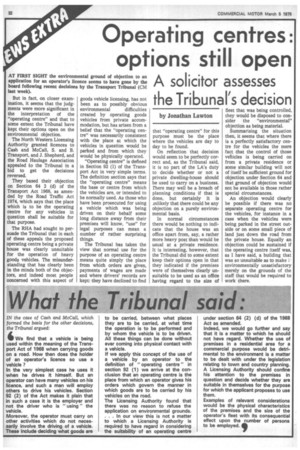Operating centres: options still open
Page 34

If you've noticed an error in this article please click here to report it so we can fix it.
A solicitor assesses the Tribunal's decision
AT FIRST SIGHT the environmental ground of objection to an application for an operator's licence seems to have gone by the board following recent decisions by the Transport Tribunal (CM last week).
But in fact, on closer examination, it seems that the judgments were more significant in the interpretation of the "operating centre" and that to some extent the Tribunal have kept their options open on the environmental objection.
The North Western Licensing Authority granted licences to Cash and McCall, S. and B. Transport, and J. Shepherd, and the Road Haulage Association appealed to the Tribunal in a bid to get the decisions reversed.
They based their objection on Section 64 2 (d) of the Transport Act 1968, as amended by the Road Traffic Act 1974, which says that the place which is to be the operating centre for any vehicles in question shall be suitable for that purpose.
The RHA had sought to persuade the Tribunal that in each of these appeals the proposed operating centre being a private house was clearly unsuitable for the operation of heavy goods vehicles. The misunderstanding that has clearly been in the minds both of the objectors, and indeed most people concerned with this aspect of goods vehicle licensing, has not been as to possibly obvious environmental difficulties created by operating goods vehicles from private accommodation, but has arisen from a belief that the "operating centre" was necessarily consistent with the place at which the vehicles in question would be parked and from which they would be physically operated.
"Operating centre" is defined in Section 92 (1) of the Transport Act in very simple terms. The definition section says that the "operating centre" means the base or centre from which the vehicles are, or intended to be normally used. As those who have been prosecuted for using a vehicle which was being driven on their behalf some long distance away from their premises will know, "use" for legal purposes can mean a number of rather surprising things.
The Tribunal has taken the view that normal use for the purpose of an operating centre means quite simply the place from which orders are given, payments of wages are made and where drivers' records are kept: they have declined to find that "operating centre" for this purpose must be the place where the vehicles are day to day to be found.
On reflection that decision would seem to be perfectly correct and, as the Tribunal said, it is no part of the LA's duty to decide whether or not a private dwelling-house should be used to carry on a business. There may well be a breach of planning conditions if that is done, but certainly it is anlikely that there could be any objection on a purely environmental basis.
In normal circumstances there would be nothing to indicate that the house was an office apart from, say, a rather more heavy post than would be usual at a private residence. It is interesting, however, that the Tribunal did to some extent keep their options open in that they indicated if the premises were of themselves clearly unsuitable to be used as an office having regard to the size of fleet that was being controlled, they would be disposed to consider the "environmental" objection as being material.
Summarising the situation then, it seems that where there is a perfectly satisfactory centre for the vehicles the mere Fact that the control of those vehicles is being carried on from a private residence or some similar building will not of itself be sufficient ground for objection under Section 64 and that ground of objection would not be available in those rather special circumstances.
An objection would clearly be possible if there was no separate operating centre for the vehicles, for instance in a case when the vehicles were being parked in the street outside or an some small piece of land just down the road from the private house. Equally an objection could be sustained if the operating centre itself was, as I have said, a building that was so unsuitable as to make i environmentally unsatisfactory merely on the grounds of the staff that would be required to work there.




















































































































































